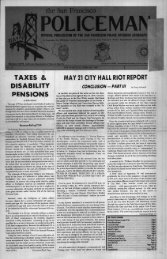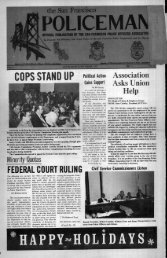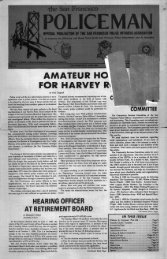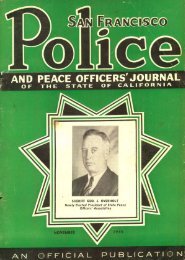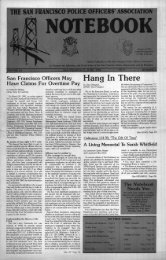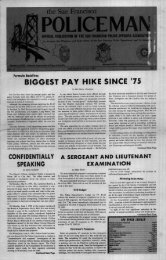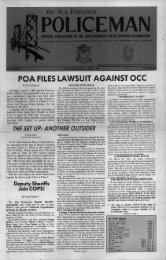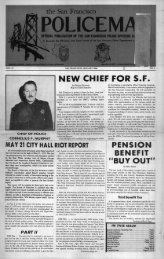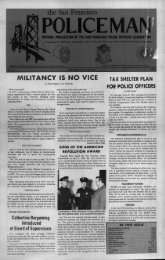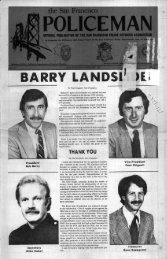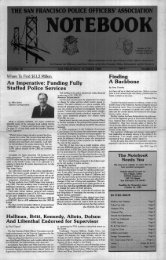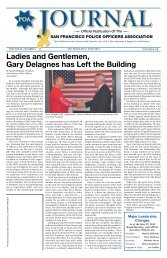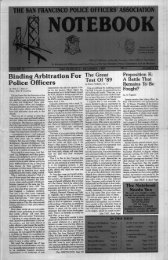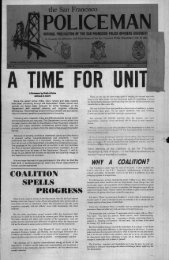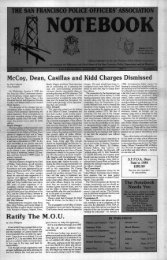(415) 822-1000 HOME (415) - San Francisco Police Officers ...
(415) 822-1000 HOME (415) - San Francisco Police Officers ...
(415) 822-1000 HOME (415) - San Francisco Police Officers ...
Create successful ePaper yourself
Turn your PDF publications into a flip-book with our unique Google optimized e-Paper software.
En<br />
Page 16 SAN FRANCISCO POLICEMAN December 1982<br />
Search Warrants____________________<br />
by William Fazio,<br />
Assistant District Attorney<br />
The article this month deals with search warrants.<br />
Search warrants are used on a daily basis by the Narcotics<br />
Bureau and are often used by other members of<br />
the Bureau. However, there is no reason why the patrol<br />
force could not make better use of search warrants.<br />
While some officers are skilled enough to prepare the<br />
affidavit in support of the warrant, it is preferable to<br />
have a deputy district attorney do it. In any case, a<br />
deputy district attorney should always be consulted<br />
with so he can review the facts to determine if a warrant<br />
will lie. I can be reached during office hours at 553-<br />
1210.<br />
A Search Warrant is:<br />
1.) An order in writing<br />
2.) In the name of the People<br />
3.) Signed by a magistrate<br />
SAN<br />
FRANCISCO<br />
BALLET.<br />
Richard E. LeBlond,jr..<br />
President and Chief Executive Officer<br />
378-18th Ave., <strong>San</strong> <strong>Francisco</strong>, CA 94121<br />
(<strong>415</strong>) 751-2141<br />
Sunday 12-5<br />
Monday thru Saturday 10 a.m.-6 p.m.<br />
3349 Sacramento Street <strong>San</strong> <strong>Francisco</strong> 94118<br />
346-5188<br />
(We ship beds anywhere in the U.S.)<br />
4.) Directed to a peace officer<br />
5.) Commanding him to search for personal<br />
property<br />
6.) To bring before a magistrate<br />
California Penal Code Section 1523<br />
Whenever possible, a search warrant should be obtained<br />
by conferring with a deputy district attorney.<br />
The law accords preference to search warrants and thus<br />
puts the burden on the defense to demonstrate to the<br />
court that the warrant is defective. A search warrant is<br />
based on an affidavit, usually that of a police officer,<br />
which demonstrates probable cause to believe that certain<br />
property is now located at a certain location. The<br />
affidavit may be based on hearsay and need not disclose<br />
the source of the information.<br />
A search warrant may be issued for:<br />
1.) Stolen or embezzled property;<br />
2.) Property or things used as the means of committing<br />
a felony;<br />
3.) When the property or things are in the possession<br />
of any person with the intent to use it as a<br />
means of committing a public offense, or in<br />
the possession of another to whom he may have<br />
delivered it for the purpose of concealing it or<br />
preventing its being discovered; and<br />
4.) When the property or things to be seized consist<br />
of any item or constitutes any evidence<br />
which tends to show that a particular person<br />
has committed a felony.<br />
California Penal Code Section 1524<br />
When an officer has reason to believe that property<br />
which comes under the above description is now at a<br />
certain location, he should contact our office and set up<br />
ZAIX<br />
Reg. S1090<br />
14^ 07-1 11 J011111 ME=<br />
PLUS 2 FREE MATTRESSES<br />
DAYBED WITH TRUNDLE. . . A link to the past,<br />
handmade of white iron and brass. Size 40"Wx<br />
79"L. Plus two free Serta Mattresses, all for $699.<br />
Have a Happy Holiday!<br />
MARKELL INCORPORATED<br />
4116 Judah St. (46th) <strong>San</strong> <strong>Francisco</strong>, CA 94122<br />
(in<br />
a meeting with a deputy district attorney to determine<br />
whether a search warrant should be issued. The officer<br />
should be prepared to relate the reasons why he believes<br />
the property will be found at the specific location. A<br />
search warrant is not limited to a search of a building,<br />
vehicles, containers, purse; the person of suspects are<br />
often the subject of a search warrant.<br />
When the search warrant is prepared, the affiant,<br />
who provides the probable cause for the warrant, must<br />
sign and date it and get it signed and dated by a<br />
magistrate. A magistrate is defined as judge of the<br />
Supreme Court, court of appeals, superior court,<br />
municipal court, and justice courts. However, it appears<br />
the primary responsibility lies with municipal<br />
court judges.<br />
A vital aspect of the service of the search warrant<br />
relates to the execution of the warrant, i.e., the entrance<br />
of the officers into the premises. The Penal Code<br />
requires that the officer "knock and notice." This<br />
means exactly what it says. The executing officers must<br />
announce their authority and purpose before entering<br />
any doors or windows. Penal Code Section 1531. If this<br />
is not done, the officers risk having all evidence suppressed.<br />
The "knock and notice" rule is excused if the<br />
officers can relate reasons why they would be in danger,<br />
or the occupants would be in immediate danger, such<br />
as information that the residents are armed or that<br />
there are hostages within the premises.<br />
If, during the search, contraband, not described in<br />
the warrant, is discovered, it can be legally seized and<br />
used for evidence assuming it was found within the<br />
scope of the search warrant. In other words, one searching<br />
for drugs would be within the scope of the warrant<br />
by looking in drawers and cabinets within the<br />
described premises. If, in so doing, a sawed-off shotgun<br />
was found, the shotgun could legally be seized.<br />
However, if the warrant was for a console T.V. set, one<br />
would have exceeded the bounds of the warrant by<br />
looking in drawers and small cabinets.<br />
When the search is complete, a copy of the warrant<br />
and a list of all property taken, must be left on the<br />
premises. The original search warrant inventory of property<br />
seized and an affidavit and the return of the<br />
search warrant must be completed and returned to the<br />
magistrate no later than 10 days from the issuance of<br />
the warrant. All property seized pursuant to the warrant<br />
should be properly marked and Stored.<br />
The use of a "paper" is an effective tool of law enforcement.<br />
Its' importance in follow-up, investigations<br />
and the procuring of evidence should not be overlooked.<br />
(<strong>415</strong>) 7779252<br />
e44e 4<br />
74€44.d4,<br />
172 CLARA ST. SAN FRANCISCO, CA 94<br />
Soriano<br />
Auto Repair<br />
1170 Thomas Ave.<br />
<strong>San</strong> <strong>Francisco</strong><br />
<strong>822</strong>-9755.<br />
<strong>San</strong>chez<br />
Truck Repair - a-i<br />
<strong>415</strong>/648-6185<br />
4040 Third Street<br />
<strong>San</strong> <strong>Francisco</strong>, Ca



